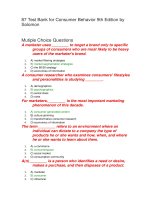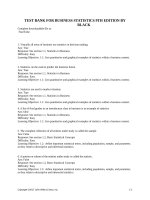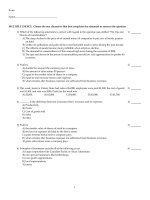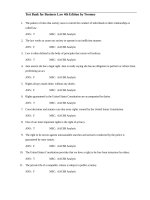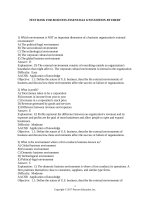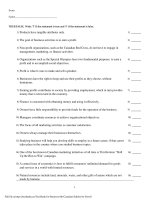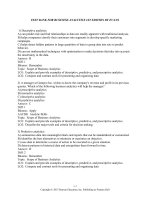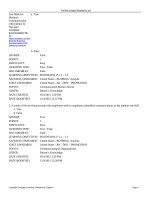Test bank for business communication 9th edition by guffey
Bạn đang xem bản rút gọn của tài liệu. Xem và tải ngay bản đầy đủ của tài liệu tại đây (271.23 KB, 21 trang )
Test Bank for Business Communication 9th Edition by Guffey
Full
file at />Name:
Class:
Date:
Chapter 01: Business Communication in the Digital Age
True / False
1. Communication today generally flows one way—from companies to the public.
a. True
b. False
ANSWER: False
2. Today’s new communication technologies have made writing skills less important than in the past.
a. True
b. False
ANSWER: False
3. You are born with the abilities to read, listen, speak, and write effectively.
a. True
b. False
ANSWER: False
4. The 21st-century economy depends mainly on information and knowledge.
a. True
b. False
ANSWER: True
5. The knowledge culture of today's workplace can include factory production employees.
a. True
b. False
ANSWER: True
6. Flattened management hierarchies allow companies to react more quickly to market changes.
a. True
b. False
ANSWER: True
7. Diverse workforces are more likely to create the products that consumers demand.
a. True
b. False
ANSWER: True
Copyright Cengage Learning. Powered by Cognero.
Page 1
Full file at />
Test Bank for Business Communication 9th Edition by Guffey
Full
file at />Name:
Class:
Date:
Chapter 01: Business Communication in the Digital Age
8. The three primary business communication functions are to inform, to persuade, and to entertain.
a. True
b. False
ANSWER: False
9. E-mail is rapidly becoming the preferred communication channel for online customer service.
a. True
b. False
ANSWER: False
10. One advantage of oral communication over written communication is that oral communication can be more easily
adjusted to the audience.
a. True
b. False
ANSWER: True
11. External communication includes sharing ideas and messages with superiors, coworkers, and subordinates.
a. True
b. False
ANSWER: False
12. Maxwell is sending an e-mail message to the Securities and Exchange Commission to ask about a specific SarbanesOxley regulation. This is an example of internal communication.
a. True
b. False
ANSWER: False
13. According to media richness theory, face-to-face conversations are the richest because they provide more helpful
cues and allow for immediate feedback.
a. True
b. False
ANSWER: True
14. Social presence is greater in asynchronous communication (e-mail, forum post) than in synchronous communication
(live chat, IM).
a. True
b. False
ANSWER: False
Copyright Cengage Learning. Powered by Cognero.
Page 2
Full file at />
Test Bank for Business Communication 9th Edition by Guffey
Full
file at />Name:
Class:
Date:
Chapter 01: Business Communication in the Digital Age
15. Information flows through formal communication channels in three directions: downward, upward, and spiral.
a. True
b. False
ANSWER: False
16. Melinda, a company department manager, frequently communicates via text messages with other department
managers within the company. This is an example of an upward flow of communication.
a. True
b. False
ANSWER: False
17. David, a payroll clerk, came up with an idea for processing payroll more efficiently and presented it to the Human
Resources Department manager. This is an example of an upward flow of communication.
a. True
b. False
ANSWER: True
18. A company’s CEO has developed a five-year strategic plan and will share it with all employees. This is an example
of downward communication.
a. True
b. False
ANSWER: True
19. To improve information flow, many of today's companies have decreased the number of operating units and
managers, thereby shortening lines of communication.
a. True
b. False
ANSWER: True
20. Managers can use the grapevine productively by sharing bad news as well as good news.
a. True
b. False
ANSWER: True
21. *Ethical standards usually consist of convenience, personal goals, and company profits.
a. True
b. False
ANSWER: False
Copyright Cengage Learning. Powered by Cognero.
Page 3
Full file at />
Test Bank for Business Communication 9th Edition by Guffey
Full
file at />Name:
Class:
Date:
Chapter 01: Business Communication in the Digital Age
22. E-mail is considered a leaner medium than face-to-face communication.
a. True
b. False
ANSWER: True
23. "Teleworkers" are employees who operate primarily in the office and are responsible for company sales via phone.
a. True
b. False
ANSWER: False
24. You can develop your professional brand by making astute comments on LinkedIn and Facebook.
a. True
b. False
ANSWER: True
25. Giving credit to external sources is important only in academic writing; on the job, it is ethical to use print or online
sources freely without documenting them.
a. True
b. False
ANSWER: False
26. The term "information worker" refers to an employee who is responsible for creating and maintaining company
databases.
a. True
b. False
ANSWER: False
27. One challenge posed by flatter organizations is that every employee must be a skilled communicator.
a. True
b. False
ANSWER: True
28. Project-based teams are becoming a thing of the past as workers are dispersed in various locations.
a. True
b. False
ANSWER: False
Copyright Cengage Learning. Powered by Cognero.
Page 4
Full file at />
Test Bank for Business Communication 9th Edition by Guffey
Full
file at />Name:
Class:
Date:
Chapter 01: Business Communication in the Digital Age
29. External communication for routine purposes is likely to be handled via e-mail.
a. True
b. False
ANSWER: True
30. The number of workers aged fifty-five and older is expected to increase significantly by the year 2022.
a. True
b. False
ANSWER: True
Multiple Choice
31. Which of the following statements about communicating in today’s workplace is most accurate?
a. Today's emphasis on teams means more face-to-face communication and less writing.
b. Communication typically flows one way: from businesses to consumers.
c. Writing skills are more important today than ever because online media requires more writing, not less.
d. Increasing numbers of workers are enjoying more defined working hours.
ANSWER: c
32. Which of the following statements about writing skills is most accurate?
a. Writing skills in today's workplace are an advantage, but they are not a necessity.
b. Only the very top level of salaried employees need good writing skills.
c. Having good writing skills can improve your chances for promotion and can result in higher earnings.
d. Today's communication technologies have made writing obsolete.
ANSWER: c
33. The 21st-century economy depends mainly on ________.
a. raw materials
b. manufacturing
c. information and knowledge
d. physical labor
ANSWER: c
34. Thinking critically means ________.
a. finding flaws in others' ideas
b. going with your gut instinct
c. being able to make decisions quickly
d. having opinions that are backed by reason and evidence
ANSWER: d
Copyright Cengage Learning. Powered by Cognero.
Page 5
Full file at />
Test Bank for Business Communication 9th Edition by Guffey
Full
file at />Name:
Class:
Date:
Chapter 01: Business Communication in the Digital Age
35. Today's employees should plan for lifelong learning and constant training, actively plan their own career paths, and
________.
a. limit their use of technology
b. count on employers to provide clearly defined working hours
c. expect to receive predictable pay increases
d. be willing to continually learn new skills
ANSWER: d
36. The most significant trends in today's dynamic workplace include global competition, team-based projects, flattened
management hierarchies, new communication technologies, and ________.
a. fewer written messages
b. more homogeneous workforces
c. expectations of around-the-clock availability
d. stricter dress codes
ANSWER: c
37. Which of the following statements about social media is most accurate?
a. Social media are still relatively new and untried communication channels for some businesses.
b. Most businesses today have discarded old media and instead use social media exclusively for communicating
and marketing.
c. Social media networks first attracted industries built on tradition and formality.
d. Social media sites such as Facebook and Twitter offer no advantages for businesses.
ANSWER: a
38. What type of technology makes it possible to locate and identify a computing device as soon as users connect to the
network?
a. Cloud computing technology
b. Blogs, podcasts, and wikis
c. Telephony
d. Presence technology
ANSWER: d
39. Gerard’s company will no longer store its data using in-house hardware and software; instead, data will be stored
online at a remote location. This type of technology is called ________.
a. telephony
b. an open office
c. cloud computing
d. Web conferencing
ANSWER: c
Copyright Cengage Learning. Powered by Cognero.
Page 6
Full file at />
Test Bank for Business Communication 9th Edition by Guffey
Full
file at />Name:
Class:
Date:
Chapter 01: Business Communication in the Digital Age
40. Kendra is responsible for updating her company’s Facebook page with information about products, promotions, and
special events. Kendra is using a communication medium called ________.
a. presence technology
b. blogging
c. social media
d. Web conferencing
ANSWER: c
41. “Around-the clock availability”
a. means that you will be paid for working 24 hours a day, 7 days a week, 365 days a year.
b. means that you may be expected to work long hours without extra compensation and be available practically
anytime and anywhere, should a crisis strike at work.
c. is illegal under U.S. law.
d. refers only to websites, not people.
ANSWER: b
42. What has led to the increase in the number of companies that operate globally?
a. The rise of new communication technologies and advanced forms of transportation
b. The removal of trade barriers
c. Saturated local markets
d. All of these (the rise of new communication technologies and advanced forms of transportation, the removal
of trade barriers, and saturated local markets)
ANSWER: d
43. Which of the following statements about global competition is least accurate?
a. Only medium and large companies compete globally.
b. Many traditional U.S. companies generate more profit abroad than locally.
c. If necessary, multinational companies should adjust their products to different palates.
d. Successful communication in global markets requires developing new skills and attitudes.
ANSWER: a
44. Which of the following statements about team-based management is least accurate?
a. Many companies use cross-functional teams to empower employees and boost their involvement in decision
making.
b. When individuals on teams don't share the same background or training, working relationships can become
strained.
c. Some organizations form ad-hoc teams that solve particular problems and then disband once they have
accomplished their objectives.
d. Companies that use team-based management prefer to train employees in teamwork skills rather than hire
new workers who already possess these skills.
ANSWER: d
Copyright Cengage Learning. Powered by Cognero.
Page 7
Full file at />
Test Bank for Business Communication 9th Edition by Guffey
Full
file at />Name:
Class:
Date:
Chapter 01: Business Communication in the Digital Age
45. Which of the following statements about workplace diversity is the most accurate?
a. Teams with diverse membership are more likely to create the products that consumers demand.
b. The number of older workers is decreasing.
c. More men pursue higher education than women.
d. A diverse staff is less able to respond to changes in the customer base in local and world markets.
ANSWER: a
46. Lucy works in an office that has nonterritorial workspaces. This is new to her, and she would like to display good
open office etiquette. What should she do?
a. Speak in a soft voice and wear headphones to cut down on noise.
b. Try to get to the office first each morning so that she always gets the best desk.
c. Engage in a lot of chitchat to get to know her coworkers better.
d. Eavesdrop as often as possible to learn about the company culture.
ANSWER: a
47. Which of the following statements about today's work environments is most accurate?
a. The "anytime, anywhere" office means that employees work fewer hours.
b. "Co-working" requires employees having to be in the office at the same time.
c. Traditional offices do not contain flexible workspaces.
d. Working from home or on the road makes communication skills even more important.
ANSWER: d
48. The three basic functions of business communication are to ________.
a. inform, entertain, and impress
b. inform, persuade, and promote goodwill
c. inform, persuade, and explain
d. inform, instruct, and entertain
ANSWER: b
49. Which of the following statements about communication in today's business organizations is most accurate?
a. Many companies used intranets to communicate with customers, outside vendors, and governmental agencies.
b. Smartphones and tablet computers are prevalent in the workplace but do not have the capabilities to replace
laptops and personal computers.
c. Wireless access is increasingly blanketing entire office buildings, airports, hotels, restaurants, school and
college campuses, cities, and other public spaces.
d. The most common workplace use of tablet computers is blogging.
ANSWER: c
Copyright Cengage Learning. Powered by Cognero.
Page 8
Full file at />
Test Bank for Business Communication 9th Edition by Guffey
Full
file at />Name:
Class:
Date:
Chapter 01: Business Communication in the Digital Age
50. Which of the following is an advantage of written communication?
a. Creates a permanent record
b. Provides immediate feedback
c. Is more personal than oral communication
d. Is effective for delivering nonverbal cues
ANSWER: a
51. Which of the following statements comparing oral and written communication is most accurate?
a. Written communication provides a permanent record only if it is sent as a hard copy, printed message.
b. Written messages do not require as much thought as oral messages.
c. One advantage of oral communication such as a face-to-face meeting is that it allows for immediate
feedback.
d. Oral communication is preferred when presenting formal or complex ideas.
ANSWER: c
52. The most prevalent communication channel in the workplace today is
a. texting.
b. e-mail.
c. face-to-face meetings.
d. Facebook.
ANSWER: b
53. Which of the following is an example of an internal organizational communication?
a. A tweet sent to a customer about a private sale that will take place tomorrow
b. A Facebook page advertising a company's products
c. A meeting of all department managers
d. An annual report sent to company stockholders
ANSWER: c
54. Which of the following is an example of external organizational communication?
a. An employee performance appraisal
b. A brochure sent to a prospective customer
c. A report recommending a change in company procedure
d. An e-mail message to employees about an upcoming training seminar
ANSWER: b
Copyright Cengage Learning. Powered by Cognero.
Page 9
Full file at />
Test Bank for Business Communication 9th Edition by Guffey
Full
file at />Name:
Class:
Date:
Chapter 01: Business Communication in the Digital Age
55. Of the following, the least rich (or leanest) communication media are ________.
a. face-to-face meetings and conversations
b. e-mail messages
c. flyers or posters
d. telephone calls
ANSWER: c
56. Daniel must handle a complex organizational issue. Which of the following media would be best for this purpose?
a. Videoconference
b. E-mail message
c. Telephone conversation
d. Face-to-face meeting
ANSWER: d
57. Social presence is defined as
a. how extroverted a person is.
b. how well a company uses social media for communication.
c. the degree of “salience” (being there) between a sender and receiver using a communication medium.
d. a person’s ability to get along with others.
ANSWER: c
58. Mina wants to use the communication medium with the highest social presence. Which of the following should she
choose?
a. E-mail
b. Blog posting
c. Discussion forum posting
d. Live chat
ANSWER: d
59. A free exchange of information helps organizations
a. respond rapidly to changing markets.
b. build employee morale.
c. serve the public.
d. do all of these (respond rapidly to changing markets, build employee morale, serve the public).
ANSWER: d
Copyright Cengage Learning. Powered by Cognero.
Page 10
Full file at />
Test Bank for Business Communication 9th Edition by Guffey
Full
file at />Name:
Class:
Date:
Chapter 01: Business Communication in the Digital Age
60. Which of the following is an example of horizontal communication in an organization?
a. Six marketing reps meet to discuss ideas for targeting new customers.
b. An accounting clerk submits a progress report about a current project to her supervisor.
c. An employee suggests to her supervisor a way to improve customer service.
d. A supervisor sends an e-mail message to all division employees detailing the newest procedure for submitting
expense claims.
ANSWER: a
61. Which of the following is an example of upward communication in an organization?
a. Three administrative assistants meet to discuss possible software upgrades.
b. A department manager sends a text message to his employees about a new overtime policy.
c. A warehouse worker suggests to his boss a way to improve employee morale.
d. The CEO sends an e-mail message to all employees inviting them to a company picnic.
ANSWER: c
62. Which of the following is an example of downward communication in an organization?
a. A business professor submits a conference report to her dean.
b. Four accountants meet to discuss the quarterly financial reports.
c. Members of a task force submit a progress report to the CEO.
d. The CFO sends information about a new accounting regulation to employees in the accounting department.
ANSWER: d
63. To improve communication and to compete more effectively, many of today’s companies have ________.
a. eliminated the grapevine
b. restructured and reengineered themselves into smaller operating units and work teams
c. discouraged free-flowing communication
d. increased the number of levels in the communication chain
ANSWER: b
64. Bert is CEO of an organization with many layers in the chain of command. He is looking for ways to reduce these
layers so that he can communicate more directly with the first-line employees. What organizational communication
barrier is he trying to overcome?
a. Lack of trust between management and employees
b. Long lines of communication
c. Closed communication climate
d. Ego involvement
ANSWER: b
Copyright Cengage Learning. Powered by Cognero.
Page 11
Full file at />
Test Bank for Business Communication 9th Edition by Guffey
Full
file at />Name:
Class:
Date:
Chapter 01: Business Communication in the Digital Age
65. Melinda was recently hired as manager of a small retail establishment. She immediately noticed that employees
seem afraid to speak with her. She wants her employees to feel comfortable coming to her about anything. What
organizational communication barrier is she trying to overcome?
a. Lack of trust between management and employees
b. Top-heavy organizational structure
c. Turf wars
d. Lack of communication skills
ANSWER: a
66. Which of the following is an example of an informal organizational communication channel?
a. A supervisor gives a performance appraisal to her subordinate.
b. An employee suggests to his supervisor a way to increase productivity in his department.
c. Research and development team members hold a virtual meeting to discuss ideas for future products.
d. An employee starts a blog to share her personal work experiences, opinions, and observations.
ANSWER: d
67. Which of the following statements about formal and informal communication channels is most accurate?
a. All relevant organizational information should flow through formal communication channels.
b. A free exchange of information within organizations should be avoided because it can lead to chaos.
c. Managers should do everything possible to avoid grapevine communication within an organization.
d. Companies should monitor social media sites to see what customers and others are saying about the company.
ANSWER: d
68. Covering up incidents, abusing sick days, lying to a supervisor, taking credit for a colleague's ideas, and inflating
grades on a résumé are examples of ________.
a. breaking the law
b. protecting your professional brand
c. unethical actions
d. workplace distrust
ANSWER: c
69. Which of the following statements about laws is least accurate?
a. People in accounting and finance should be aware of the Sarbanes-Oxley Act.
b. Anything published on the Internet is in the public domain and can be used freely.
c. Assume that anything produced privately after 1989 is copyrighted.
d. The concept of fair use gives individuals limited rights to use copyrighted materials without requiring
permission.
ANSWER: b
Copyright Cengage Learning. Powered by Cognero.
Page 12
Full file at />
Test Bank for Business Communication 9th Edition by Guffey
Full
file at />Name:
Class:
Date:
Chapter 01: Business Communication in the Digital Age
70. Ethical business communicators strive to tell the truth, label opinions so that they are not confused with facts, are
objective, communicate clearly, use inclusive language, and ________.
a. ensure that communication flows upward, downward, and horizontally
b. give credit when using the ideas of others
c. encourage feedback
d. choose appropriate channels of communication
ANSWER: b
71. When faced with an ethical dilemma, what is the first question you should ask?
a. What would my family, friends, and coworkers think?
b. Would I take this action if I were on the opposite side?
c. Is the action I am considering legal?
d. Would a trusted advisor agree with this action?
ANSWER: c
72. Because your department has not reached its sales quota, your boss has asked you to change figures to show that
sales were higher than they actually were. Which of the following questions is not important as you decide what to
do?
a. Is the action you are considering legal?
b. Are there better alternatives?
c. Would family, friends, or coworkers approve?
d. What is the best channel of communication to use in responding to your boss?
ANSWER: d
73. Achieving literacy in the digital age requires using multimedia applications, staying connected to people and
knowledge via technology, using technology thoughtfully and professionally, and ________.
a. ensuring that you have the latest-model phone or tablet
b. facilitating more face-to-face meetings
c. learning various computer programming languages
d. thinking critically about new media
ANSWER: d
74. Which of the following is the first step in solving business problems competently?
a. Gathering the necessary people together for a face-to-face meeting
b. Generating feasible ideas for a solution
c. Understanding the problem clearly
d. Determining a deadline for implementing the solution
ANSWER: c
Copyright Cengage Learning. Powered by Cognero.
Page 13
Full file at />
Test Bank for Business Communication 9th Edition by Guffey
Full
file at />Name:
Class:
Date:
Chapter 01: Business Communication in the Digital Age
75. The term used to describe the overall impression you continue to build throughout your career is your “professional
________.”
a. communication
b. brand
c. resume
d. style
ANSWER: b
76. The impact of mobile technology and globalization on today’s workplace includes the need for communication skills
to be adapted to various cultures, workers expected to be accessible 24/7, multinational companies adjusting their
products to meet cultural tastes and practices, and ________.
a. writing skills becoming less important
b. an increasingly blurred line between work and leisure
c. more employees working part time
d. less frequent communication among coworkers
ANSWER: b
77. "Flattening" of management hierarchies most directly refers to ________.
a. fewer layers of managers separating decision makers from line workers
b. employees being promoted to supervisory positions more quickly
c. more managers overseeing decision making
d. hiring freezes implemented to save money
ANSWER: a
78. An important benefit of “flat” organizational structures is that ________.
a. employees work fewer hours
b. decision makers can react more quickly to market changes
c. face-to-face meetings are unnecessary
d. all operations can remain in the same country
ANSWER: b
79. The “grapevine” is most accurately described as ________.
a. frowned-upon water cooler discussions that impede productivity
b. an informal channel of communication that carries organizationally relevant gossip
c. an e-mail chain involving multiple people to make a decision
d. an organizational newsletter detailing recent accomplishments
ANSWER: b
Copyright Cengage Learning. Powered by Cognero.
Page 14
Full file at />
Test Bank for Business Communication 9th Edition by Guffey
Full
file at />Name:
Class:
Date:
Chapter 01: Business Communication in the Digital Age
80. Managers can use the grapevine productively by respecting employees' desire to know, acting promptly to correct
misinformation, and ________.
a. sharing only good news to keep employee morale high
b. sharing both good and bad news
c. decreasing the amount of information delivered through formal channels
d. becoming an active part of the grapevine to spy on employees
ANSWER: b
81. Media richness most directly refers to ________.
a. the cost of the communication channel
b. the length of a written message
c. the amount of helpful cues and immediate feedback a medium provides
d. the level of the person who sends the message
ANSWER: c
82. Media with high social presence ________.
a. involve written communication
b. are personal and convey warmth
c. are sent via Twitter or Facebook
d. must have a large audience
ANSWER: b
83. Language is discriminatory when it ________.
a. stereotypes, insults, or excludes people
b. contains grammatical or mechanical errors
c. lacks clarity and conciseness
d. is not written in the reader’s first language
ANSWER: a
84. Teleworkers, employees who remain outside of the office most of the time, and self-employed individuals now
represent roughly ________ percent of the workforce.
a. 5
b. 15
c. 20
d. 30
ANSWER: d
Copyright Cengage Learning. Powered by Cognero.
Page 15
Full file at />
Test Bank for Business Communication 9th Edition by Guffey
Full
file at />Name:
Class:
Date:
Chapter 01: Business Communication in the Digital Age
85. In addition to possessing strong communication skills, today's workers must also be media savvy, which means
________.
a. exercising good judgment when posting messages on the Internet and writing e-mails
b. using effective marketing tools to promote a company's products and services
c. increasing their computer programming skills
d. connecting with large numbers of people on LinkedIn
ANSWER: a
86. A study by the National Association of Colleges and Employers revealed that a majority of employers consider a
minimum GPA of ________ as a cutoff point when screening candidates.
a. 3.5
b. 3.0
c. 2.5
d. 2.0
ANSWER: b
87. You can manage and protect your professional "brand" online by posting thoughtfully to blogs, writing competent emails, and ________.
a. avoiding social media sites such as Twitter and Facebook
b. updating your resume monthly
c. making astute comments on social media sites
d. choosing face-to-face interactions over writing
ANSWER: c
88. Sensitive communicators know the difference between facts and opinions. Which of the following statements would
be considered factual?
a. Consumers are willing to pay more for a product if they believe that it was produced ethically under fair-trade
standards.
b. Social responsibility is a marketing tool to increase sales.
c. Women have been limited by the corporate "glass ceiling."
d. Women are starting businesses at two times the rate of men.
ANSWER: d
89. In which part of the globe do today's workers put in the longest hours on average?
a. Japan
b. Europe
c. United States
d. Middle East
ANSWER: c
Copyright Cengage Learning. Powered by Cognero.
Page 16
Full file at />
Test Bank for Business Communication 9th Edition by Guffey
Full
file at />Name:
Class:
Date:
Chapter 01: Business Communication in the Digital Age
90. A ________ is a website that allows multiple users to create and edit pages collaboratively.
a. blog
b. wiki
c. podcast
d. toolbox
ANSWER: b
Completion
91. A knowledge or information worker engages in mind work and is paid for his or her education and ability to
________.
ANSWER: learn
92. The three primary functions of business communication are to inform, to persuade, and to promote
____________________.
ANSWER: goodwill
93. ________________ communication includes exchanging ideas and messages with superiors, coworkers, and
subordinates.
ANSWER: Internal
94. ________________ communication includes exchanging ideas and messages with customers, suppliers, the
government, and the public.
ANSWER: External
95. _______________ richness theory attempts to classify media in organizations according to how much clarifying
information they are able to convey from a sender to a recipient.
ANSWER: Media
96. Media with high _____________ presence convey warmth and are personal.
ANSWER: social
97. Official information among workers typically flows through formal channels in three directions:
_________________, upward, and horizontally.
ANSWER: downward
98. Policies, procedures, directives, job plans, and mission goals flow ____________________ from managers to
employees.
ANSWER: downward
Copyright Cengage Learning. Powered by Cognero.
Page 17
Full file at />
Test Bank for Business Communication 9th Edition by Guffey
Full
file at />Name:
Class:
Date:
Chapter 01: Business Communication in the Digital Age
99. Feedback from employees to management forms the ____________________ flow of communication in most
organizations.
ANSWER: upward
100. The ____________________ is an informal channel of communication that carries organizationally relevant gossip
and functions through social relationships.
ANSWER: grapevine
101. ____________________ refers to the conventional standards of right and wrong that prescribe what people
should do.
ANSWER: Ethics
102. Under the concept of ___________ use, individuals have limited rights to use copyrighted material without requiring
permission.
ANSWER: fair
103. Ethical business communicators are ______________ when they recognize their own biases and strive to keep
them from distorting a message.
ANSWER: objective
104. __________ English laws require businesses to write policies, warranties, and contracts in language comprehensible
to average readers.
ANSWER: Plain
105. ____________________ language does not discriminate against individuals or groups on the basis of their sex,
ethnicity, disability, race, sexual orientation, or age.
ANSWER: Inclusive
106. When communicating internally in writing, you will probably use ________, which is the most prevalent
communication channel in the workplace today.
ANSWER: e-mail
107. One contemporary form of interactive and mobile communication is the ________, which is a secured local network
within an organization.
ANSWER: intranet
108. Workplace ________, which includes differences in ethnicity, age, and gender, is important because it is likely to
result in the products that consumers demand.
ANSWER: diversity
109. In today's increasingly complex, networked digital environment, job candidates with exceptional ________ skills
immediately stand out.
ANSWER: communication
Copyright Cengage Learning. Powered by Cognero.
Page 18
Full file at />
Test Bank for Business Communication 9th Edition by Guffey
Full
file at />Name:
Class:
Date:
Chapter 01: Business Communication in the Digital Age
110. Achieving literacy in the digital age means thinking ________ about new media.
ANSWER: critically
Essay
111. Explain why having strong writing skills is important in today’s digital world.
ANSWER: Student answers will vary and should touch on some or all of the following points.
Writing skills can be your ticket to work—or your ticket out the door. Two thirds of salaried employees
have some writing responsibility. However, about one third of them do not meet the writing requirements
for their positions. Businesses desperately need employees who can write well. Effective writing skills
can be a stepping stone to great job opportunities, or, if poorly developed, may derail a career. Writing is
a marker of high-skill, high-wage, professional work; if you can’t express yourself clearly, you limit your
opportunities for many positions. Long gone are the days when business was mostly conducted face-toface and when administrative assistants corrected spelling and grammar for their bosses. Although
interpersonal skills still matter greatly, writing effectively is critical. Ever since the digital revolution swept
the workplace, most workers write their own messages. Writing matters more than ever because the
online media require more of it, not less.
Copyright Cengage Learning. Powered by Cognero.
Page 19
Full file at />
Test Bank for Business Communication 9th Edition by Guffey
Full
file at />Name:
Class:
Date:
Chapter 01: Business Communication in the Digital Age
112. Describe five trends occurring in today's dynamic workplace and discuss how communication skills are related to
those changes.
ANSWER: Students will select five of the following and answers will vary.
Social media and changing communication technologies: To use new communication technologies,
including social media, the Internet, e-mail, instant messaging, text messaging, voice mail, telephony,
smartphones, powerful laptop computers and tablets, satellite communications, wireless networking,
teleconferencing, videoconferencing, blogs, wikis, and presence technology effectively, skilled
business communicators must develop a tool kit of new communication skills including how to select
the best communication channel, how to use each channel safely and effectively, and how to
incorporate the latest technologies and search tools efficiently.
"Anytime, anywhere": 24/7/365 availability offices:
As you rise on the career ladder, you may be
expected to work long hours without extra
compensation and be available practically anytime
and anywhere, should a crisis strike at work. In many
industries information workers are expected to
remain tethered to their workplaces with laptops,
tablets, and smartphones around the clock and on
weekends.
The global marketplace and competition: Successful communication in global markets requires
developing new skills and attitudes. These include cultural knowledge and sensitivity, flexibility, and
patience. If necessary, multinational companies even adjust their products to different palates.
Shrinking management layers: Today's flatter organizations require that every employee be a skilled
communicator. Frontline employees, as well as managers, participate in critical thinking and decision
making. Nearly everyone is a writer and a communicator.
Collaborative environment and teaming: When companies form cross-functional teams, individuals
must work together and share information. These employees must develop strong interpersonal,
negotiation, and collaboration skills.
Growing workforce diversity: Business
communicators must be able to interact with many
coworkers who differ from them in race, ethnicity,
gender, age, and many other ways.
Virtual and nonterritorial offices: Working in open offices, having flexible working arrangements,
telecommuting, and being a member of virtual teams all require the need for even stronger
communication skills. Staying connected involves sending messages, most of which are written,
meaning that one's writing skills are constantly on display.
Copyright Cengage Learning. Powered by Cognero.
Page 20
Full file at />
Test Bank for Business Communication 9th Edition by Guffey
Full
file at />Name:
Class:
Date:
Chapter 01: Business Communication in the Digital Age
113. Explain media richness theory and give an example of a rich medium and a lean medium.
ANSWER: Student answers will vary.
Media richness theory attempts to classify media in organizations according to how much clarifying
information they are able to convey from a sender to a recipient. The more helpful cues and immediate
feedback the medium provides, the richer it is. The richest media are face-to-face conversations and
meetings. The leanest media are newsletters, flyers, bulletins, and posters.
114. Compare and contrast formal and informal channels of organizational communication.
ANSWER: Student answers will vary.
Information flows formally in organizations in three ways:
Downward flow: Information flowing downward generally moves from decision makers,
including the CEO and managers, through the chain of command to workers. This
information includes job plans, policies, procedures, and feedback about employee
performance.
Upward flow: Information flowing upward provides feedback from nonmanagement
employees to management. This information includes such items as progress reports and
suggestions.
Horizontal flow: Lateral channels transmit information horizontally among workers at the
same level. These channels enable individuals to coordinate tasks, share information, solve
problems, and resolve conflicts.
Information also flows informally in organizations, most commonly through the grapevine, an informal
channel of communication that functions through social relationships and carries organizationally relevant
gossip. The grapevine can also be used by managers as an excellent source of information about
employee morale and problems.
115. Discuss the importance of workplace ethics, including examples of (a) guidelines for ethical behavior and (b)
questions to ask yourself when faced with ethical dilemmas.
ANSWER: Student answers will vary.
Ethics refers to conventional standards of right and wrong that prescribe what people should do. Dealing
honestly with colleagues and customers develops trust and builds strong relationships, especially
important in today's business environments. Guidelines for ethical behavior include abiding by the law,
telling the truth, labelling opinions, being objective, communicating clearly, using inclusive language, and
giving credit.
Questions to ask yourself when faced with ethical dilemmas at work include: Is the action legal? Would I
do this if I were on the opposite side?Can I rule out a better alternative? Would a trusted advisor agree?
Would family, friends, employer, or coworkers approve?
Copyright Cengage Learning. Powered by Cognero.
Page 21
Full file at />
